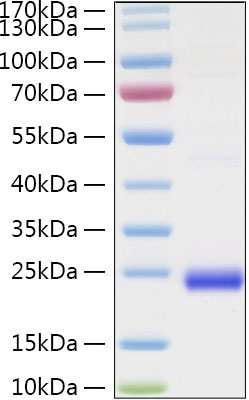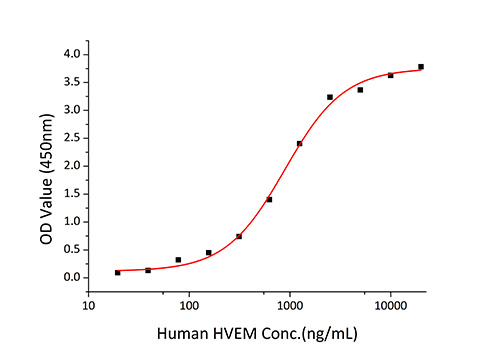Description
| Product Name: | Recombinant Human TNFSF14/LIGHT/HVEM-L/CD258 Protein |
| SKU: | RPCB0959 |
| Size: | 10µg |
| Tag: | N-his |
| Reactivity: | Human |
| Expression Host: | HEK293 cells |
| Protein Description: | High quality, high purity and low endotoxin recombinant Recombinant Human TNFSF14/LIGHT/HVEM-L/CD258 Protein , tested reactivity in HEK293 cells and has been validated in SDS-PAGE.100% guaranteed. |
| Endotoxin: | Please contact us for more information. |
| Purity: | > 95% by SDS-PAGE. |
| Formulation: | Lyophilized from a 0.22 μm filtered solution of PBS, pH 7.4. |
| Gene ID: | 8740 |
LIGHT, also known as TNFSF14 or CD258, is a newly identified member of the TNF superfamily (TNFSF14) that is expressed by activated T lymphocytes, monocytes, granulocytes, spleen cells, and immature dendritic cells. TNFSF14 / LIGHT / CD258 is a type II transmembrane protein that is known to bind 2 membrane-bound TNFSF signaling receptors: HVEM, which is predominantly expressed by T cells, and lymphotoxin β receptor (LTβR), which is expressed by stromal cells and nonlymphoid hematopoietic cells. TNFSF14 / LIGHT / CD258 also binds to a soluble non-signaling receptor, decoy receptor 3 (DcR3), which can modulate the function of LIGHT in vivo. TNFSF14 / LIGHT / CD258 can also costimulate T cell responses via HVEM, which is constitutively expressed in most lymphocyte subpopulations, including CD4+and CD8+T cells. In addition, TNFSF14 / LIGHT / CD258 has been shown to suppress tumor formation in vivo and to induce tumor cell apoptosis via the up-regulation of intercellular adhesion molecule 1 and an increased lymphocyte adhesion to cancer cells. Thus, TNFSF14 / LIGHT / CD258 is being actively investigated as a possible basis for cancer treatment.
| Storage: | Store at -20℃.Store the lyophilized protein at -20℃ to -80 ℃ up to 1 year from the date of receipt.After reconstitution, the protein solution is stable at -20℃ for 3 months, at 2-8℃ for up to 1 week. |
| Reconstitution: | Centrifuge the vial before opening. Reconstitute to a concentration of 0.1-0.5 mg/mL in sterile distilled water. Avoid vortex or vigorously pipetting the protein. For long term storage, it is recommended to add a carrier protein or stablizer (e.g. 0.1% BSA, 5% HSA, 10% FBS or 5% Trehalose), and aliquot the reconstituted protein solution to minimize free-thaw cycles. |
| Swiss-Prot: | O43557 |








